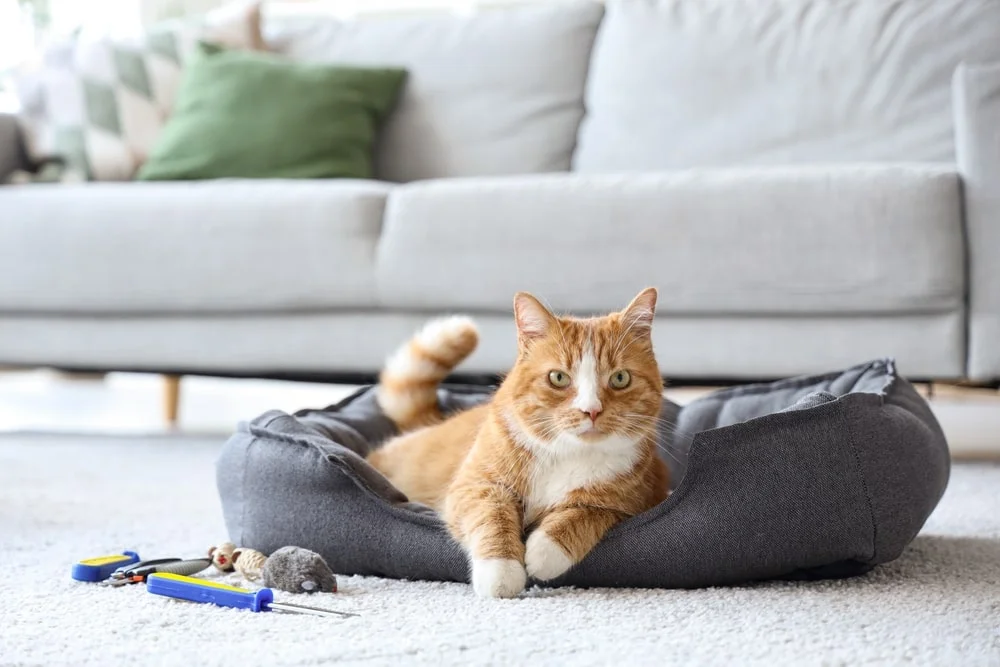Finding a mess of diarrhea from your cat — whether in their litter box or somewhere less convenient — can be an unfortunate surprise for you and them. Cat diarrhea could be caused by a minor digestive upset, or it could be a sign of a more serious underlying health issue.
Let’s explore the reasons your feline friend may have diarrhea, when to take them to the vet, and what treatment might look like once you have a diagnosis.
A MetLife Pet Policy May Help You Cover Cat Diarrhea Costs
Enroll Your Cat Today
Reasons Your Cat May Have Diarrhea
Diarrhea is unformed stools — usually appearing watery or soft — that have moved too quickly through a cat’s intestines. When stools move too fast, it causes a decrease in water, nutrient, and electrolyte absorption, which can perpetuate the condition. A variety of things can cause cat diarrhea, more commonly including:1,2
- Parasites
- Dietary indiscretion
- Food allergies
- Bacteria or viruses
- Toxins or poisoning
- Stress
- Inflammatory bowel disease (IBS)
More serious underlying health conditions can also cause cat diarrhea. These include kidney or liver disease, cancer, feline distemper, hyperthyroidism, immunodeficiency, or neurological issues.2
Types of Cat Diarrhea
Different types of diarrhea can give a vet clues about what’s going on with your kitty. While not so pretty to think about, here’s an idea of what different colors and types might mean:3
- Bloody or bright red: Lower intestinal tract bleeding
- Black or dark red: Upper intestinal tract bleeding or digested blood
- Yellow: Bacteria, zinc poisoning, anemia, or liver issues
- Green: Digested grass, green-dyed food or treats, or gallbladder issues
- Mucus coated: Parasites, inflammation, or dehydration
If you see blood in your cat’s stool, it’s advised that you take them to your vet for a full examination.3
When To See a Vet About Cat Diarrhea
Many cases of diarrhea in cats are short-lived (acute diarrhea) due to a minor digestive upset or stressful event — like if you changed your cat’s food or went on a vacation. Sometimes, acute diarrhea can resolve itself. But if loose stools don’t seem to be caused by an apparent diet or lifestyle change, your cat will likely require a vet visit for treatment.2,3
When diarrhea happens for extended periods of time or is recurring (chronic diarrhea), this typically indicates the presence of a more serious health condition needing medical attention.2,3 It’s a good idea to take your cat to the vet ASAP if they’re also showing signs of:1,2
- Lethargy
- Vomiting
- Lack of appetite
- Dehydration
- Fever
- Abdominal pain
- Bloody diarrhea
You likely know your cat’s litter box habits. So it can be beneficial to take them to the vet when you notice something abnormal. If they’re showing signs of a more severe health issue, your cat may need to be hospitalized for a short time to help stabilize them.3
Cat Diarrhea Treatment
During your cat’s physical exam by your vet, they may also run some tests to diagnose the cause of the diarrhea. These could include a fecal exam, blood work, endoscopic exam, bacterial cultures, X-rays, or ultrasounds. Giving your vet details on the frequency, color, and consistency of your cat’s diarrhea, as well as any other symptoms you’ve seen, can help them with the diagnosis.1,2
Once a diagnosis has been confirmed, your vet can create the right plan for your cat to help them feel better. Cat diarrhea treatment can include:1,3
- Intravenous (IV) fluids for supportive care and dehydration
- Medications for relieving nausea, diarrhea, or vomiting
- De-wormers or antibiotics for treating parasites or infections
- Specific medications or treatments, depending on the underlying cause
A diet change, getting plenty of water, and resting will likely accompany any treatment plan for cat diarrhea to help prevent additional bouts or further dehydration. Transitioning your cat back to their normal food, or to their new vet-prescribed diet, should be done over time to prevent more digestive upsets.3
What Can You Give Your Cat for Diarrhea at Home?
When your cat experiences digestive discomfort, you may be tempted to reach for human over-the-counter (OTC) medications to help soothe them — like Pepto-Bismol®4 or similar meds. Unfortunately, there are no human OTC medications that can safely help relieve cat diarrhea. It’s recommended to contact your vet when you notice diarrhea or any other symptoms with it.2
For minor cases of cat diarrhea, your vet may suggest a special veterinary diet, alongside probiotics or anti-diarrheals, for a few days at home to get your cat’s digestive system back on track.1 You might also be able to give your cat pure, canned pumpkin or cat-specific OTC supplements to help increase their fiber intake and firm up their stools. Ask your vet before giving your cat any of these to make sure it’s safe.3
Get Coverage for Cat Diarrhea Treatment and Diagnostic Costs
Cat diarrhea isn’t fun for anyone, and neither are the vet bills that can come with it. With a MetLife Pet Insurance policy, you could get reimbursed up to 90% on covered costs to help your cat feel better — like diagnostic tests, vet exam fees, medications, and more.5
When Solo the kitten developed a tapeworm infection and had a lot of diarrhea, his exam and diagnostic bill was nearly $300. Under his family’s MetLife Pet policy, they got over $250 back. And for Faith the cat, her owner was reimbursed around $45 on the almost $60 fecal exam that helped diagnose her diarrhea as a symptom of intestinal parasites.6
Help relieve some of the discomfort of costly vet bills by getting a free, personalized quote for a cat insurance policy today.


